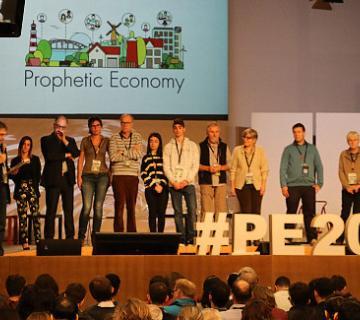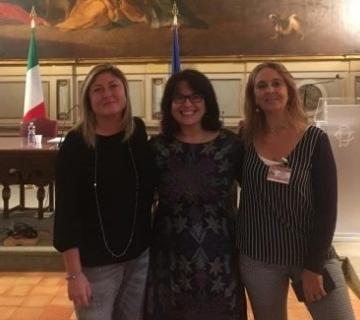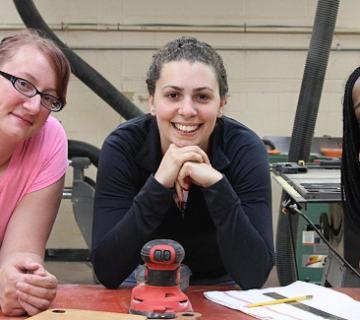“The Economy of communion was born
to rekindle the spirit and the way of life of the first Christians:
‘They were one heart and one soul and no-one among them was in need’.
Nowadays a little bit of charity is not sufficient.
We need entire businesses to freely put their profits in common.
Used in this way, our capital will yield immeasurable returns
because our giving will open God’s hands”. (Chiara Lubich)
In relaunching the Economy of Communion ten years after its birth, Chiara Lubich, at the opening of the School for Entrepreneurs, spoke in depth about the spiritual foundations on which the Economy of Communion has been based since its debut at San Paolo in Brazil. These spiritual roots “must always sustain it as a guarantee of its authenticity”, Chiara said.
The Economy of Communion (EOC) is certainly an audacious project. It concerns business proprietors willing to donate a part of their profits to those in need instead of getting rich themselves. And while part of the profits are used to develop the business itself, another part is allocated for the formation of “new people”. But how can such businesses survive within the rigid confines of the market economy?
From the beginning of her talk, and using no half measures, Chiara Lubich affirmed that the EOC is not only an activity that is the fruit of projects and ideas of talented people. It is a reality present in one of the modern day Movements inspired by the Holy Spirit, and thus the work of God.
Everything started 10 years ago during one of Chiara’s trips to Brazil where she saw the drama of the poverty in the favelas (shanty towns) that surround the big cities.
With great passion, Chiara focussed on the intention for which this project had arisen: to fulfil those words from the Acts of the Apostles which refer to the early Church: “They were one heart and one soul; everything among them was in common. No one was in need”. Her appeal to keep at the forefront of our minds “our fellow brothers and sisters burdened by their daily struggle for survival” was a strong reminder. “Nowadays a little bit of charity is not enough,” she continued, “We need entire businesses and companies to freely put their profits in common.”
She spoke with just as much passion of the “culture of giving” that has its roots entirely in that promise: “Give and you will be given, with a measure pressed down and overflowing”, a promise which can be verified even in the running of the business. “Using our capital in this manner,” she said, “yields immeasurable returns, because our giving opens God’s hands”.
Of course we must form “new people”, those lay people of this new millennium who become saints not “in spite of” economics or politics, but even when fully immersed in politics and economics. At this point Chiara launched the idea of repeating this first school of formation all over the world.
750 businesses in 5 continents draw their inspiration from the Economy of Communion which is attracting increasing interest on the part of economists and sociologists, in universities and other educational institutions. Innumerable meetings have addressed this topic in varying degrees, and over one hundred academic theses on this subject have been completed.
The history and developments that have occurred during these 10 years were outlined by the sociologist Vera Araujo and by entrepreneur Alberto Ferrucci. In their talks, they touched on the following two aspects: the distribution of profits to more than 10,000 families in need, and the guidelines for running the businesses which emerge from the experience of the businesses themselves.
Many entrepreneurs present then gave their experience. Among the businesses presented were: “Solidar Capital” (Germany) and the businesses it finances in Lebanon and Israel, Unilab – Information Technology (Italy). Then followed a video presentation of the ‘Spartaco Industrial Complex’, the pilot industrial structure built in the Focolare Movement’s little town Mariapolis Araceli (now known as Mariapolis Ginetta), near San Paolo, Brazil. Other businesses presented were from Goa (India), from Italy, from Cameroon, as well as the Asia Management Training Centre Project in the Philippines which is collaborating with Italian entrepreneurs who want to adopt this project in Europe.
During the interval, various workshops were held according to the type of business activity: information technology, manufacturing, commerce, academic studies, consultancy services, tourism and human services. These were important moments of dialogue among businesses from all over the world who had gathered together for the first time since the birth of the Economy of Communion.
“Challenges and prospects of the Economy of Communion today” was at the centre of a lively debate between the participants and a panel made up of the Brazilian sociologist Vera Araujo, Professor Luigino Bruni, lecturer in History of Economics in the State University of Milan (Italy) and Alberto Ferrucci entrepreneur.
Professor Bruni outlined the first ideas of a new economic theory in his talk: “Economy of Communion: Facts and Ideas for a New Humanism”. Sociologist Vera Araujo presented a broad study of “The Culture of Giving”. Professor Benedetto Gui, lecturer in Economics at the University of Padova, Italy, gave his talk: “Towards an economic conduct based on communion”.
“The challenges of the Economy of Communion in present day economics” was debated by a panel of experts composed of university lecturers Manuela Silva (Portugal), Cristina Calvo (Argentina), Rocio Marques (Malaga, Spain), and Stefano Zamagni (Bologna, Italy) who concluded the meeting with a presentation welcomed with great enthusiasm by all the participants.
Professor Zamagni indicated the Economy of Communion, and its culture of love, as an antidote to the culture of “competition” that invades all the spheres in human relations (politics, family etc). This Economy of Communion, according to the economist from Bologna, will increasingly become a ground breaking experience in this delicate phase when new avenues for a truly just and promising economy are being researched.


 Italiano
Italiano Español
Español Français
Français Português
Português


